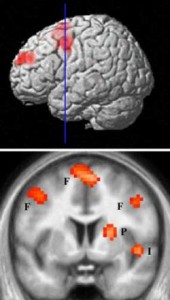Published: October 28, 2008

The "hate circuit" of the brain – areas that activate when looking at a hated person – revealed by fMRI scans. F = frontal cortex; P = putamen; I = insular (Credit: UCL)
The proverbs tell us that there’s a fine line between love and hate, and new scans of the brain’s “hate circuit” have confirmed similarities between the two powerful emotions.
But whereas loved-up partners are likely to be less rational, the new scans show hate to be colder and more calculating. Click to continue reading this New Scientist feature
Source: New Scientist, Journal reference: PLoS ONE (DOI: 10.1371/journal.pone.0003556)
Published: September 24, 2008

Listen to podcastÂ

Image: iStockphoto
When you’re upset or depressed, should you analyze your feelings to figure out what’s wrong? Or should you just forget about it and move on?
New research suggests a solution to these questions and to a related psychological paradox: Pocessing emotions is supposed to facilitate coping, but attempts to understand painful feelings often backfire and perpetuate or strengthen negative moods and emotions. [continue reading…]
Published: February 7, 2008
How you are feeling has an impact on your routine economic transactions, whether you’re aware of this effect or not.
In a new study that links contemporary science with the classic philosophy of William James, a research team finds that people feeling sad and self-focused spend more money to acquire the same commodities than those in a neutral emotional state. The team’s paper, “Misery is not Miserly: Sad and Self-Focused Individuals Spend More,” will be published in the June 2008 edition of Psychological Science and will be presented at the Society for Social and Personality Psychology’s Annual Meeting on Feb. 9. [continue reading…]
Published: October 18, 2007
Too Much Happiness May Be Too Much of a Good Thing
Are you happy? Well don’t try to be happier; you might become less happy. That is the gist of a multi-cultural study published this month in the Journal of Personality and Social Psychology. [continue reading…]


